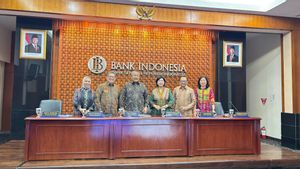JAKARTA – The UK government set out a detailed plan on Monday, April 4, to harness the potential of crypto assets and the underlying blockchain technology, to help consumers make payments more efficiently.
As part of creating a global cryptoasset hub, the UK's Minister for Financial Services, John Glen, said the UK would pass legislation to bring some stablecoins under a regulatory net such as complying with existing payment rules.
A stablecoin is a cryptocurrency designed to have a stable value relative to traditional currencies, or commodities such as gold, to avoid the volatility that would make bitcoin and other digital tokens impractical for most trading.
The UK government also said all stablecoins that reference fiat currencies must be regulated.
"This approach will ensure convertibility to fiat currency, on par and on demand," Glen said. It also added that the Bank of England would regulate “systemic” stablecoins.
Later this year the UK will consult on rule-making for broader crypto assets such as bitcoin, taking into account the sector's energy consumption.
“If crypto technology is going to be a big part of the future, then we in the UK want to step in, and on the ground floor,” Glen told UK Fintech Week. "We see great potential in crypto and we want to give ourselves every opportunity to take maximum profit."
The UK's "detailed plan" will also develop the potential of blockchain, including whether it can be used to issue UK government bonds or gilts. "I don't know the answer but let's find out," said Glen.
Regulators globally are trying to grapple with cryptocurrencies, while the European Union is ahead with draft laws on crypto markets.
The UK Treasury Secretary, Rishi Sunak, has also asked the Royal Mint to create a non-exchangeable token that will be issued in the summer. An NFT is a digital asset that exists on a blockchain, a record of transactions stored on networked computers.
SEE ALSO:
According to Glen, a regulatory “sandbox” will be launched by the Bank of England and the FCA next year to test the use of blockchain in market infrastructure, Glen said.
He added that the Law Commission will consider the legal status of decentralized autonomous organizations that use blockchain, while the implications of crypto on taxes will also be studied.
"On balance, we don't think the tax code will require major operations to make it work easier for cryptocurrencies," Glen said.
The tax treatment of "defi" loans - where holders of crypto assets lend their assets for return - will be assessed.
The UK will also remove disincentives for fund managers to include crypto assets in their portfolios, Glen added.
The English, Chinese, Japanese, Arabic, and French versions are automatically generated by the AI. So there may still be inaccuracies in translating, please always see Indonesian as our main language. (system supported by DigitalSiber.id)















